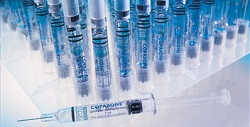First, it was Copaxone. Now, it's Gleevec. Between the two off-patent drugs, one thing is clear: generics aren't sabotaging the market share of these branded meds the way they usually do. So what's going on?
 As Bernstein analyst Ronny Gal wrote in a recent note to investors, Teva ($TEVA) tried a new strategy when working to protect Copaxone's market share. Instead of offering up discounts to retailers and wholesalers, it went straight to payers with the price break--in exchange for brand exclusivity versus Copaxone's first generic competitor, Sandoz's Glatopa.
As Bernstein analyst Ronny Gal wrote in a recent note to investors, Teva ($TEVA) tried a new strategy when working to protect Copaxone's market share. Instead of offering up discounts to retailers and wholesalers, it went straight to payers with the price break--in exchange for brand exclusivity versus Copaxone's first generic competitor, Sandoz's Glatopa.
The result? "When Sandoz showed up with a traditional discount to the channel, it found out those buyers could not shift volume to its products as the determination of preferred product was made by the payers," Gal noted. Most payers were locked into "rights to match" contracts with Teva, and it didn't "make economic sense for Sandoz to try to compete Teva down to its walk away price."
Instead, Sandoz took that strategy back to parent company Novartis ($NVS)--and used it when trying to fend off copies of its own aged blockbuster, Gleevec. Ahead of a generic entry from India's Sun Pharma, they contracted with insurers, who blocked Sun from the majority of accounts.
The result has been that Teva recently surprised the market by retaining between 70% and 75% of Copaxone 20mg's share in the face of Glatopa competition, while Sun recently announced that its exclusive Gleevec generic would only grab a 30% piece of the pie. But for other branded drugmakers looking to replicate these successes, Gal has a few caveats.
First off, companies that don't leave a percentage of the market to their copycat rivals could spur a pricing war, he pointed out. And secondly, in cases where a second or third knockoff comes along, one late entrant will likely drop its price by 70% to 80% to capture a corner of the market.
And as Gal cautioned, Teva and Novartis' experiences don't mean that the incumbent brand will always win. "We suspect some generics will be proactive in seeking deals with payers for their exclusive generic launches," he wrote--especially companies like Teva and Novartis, who can send their generics reps along with their managed market teams to negotiate 2017 contracts with payers.
"Finally, an advantage to being a branded-generic hybrid," he mused.
Special Reports: Top 10 Drug Patent Losses of 2015 - Copaxone | Top 20 generics companies by 2014 revenue - Teva - Novartis - Sandoz | Top 10 best-selling cancer drugs of 2013 - Gleevec